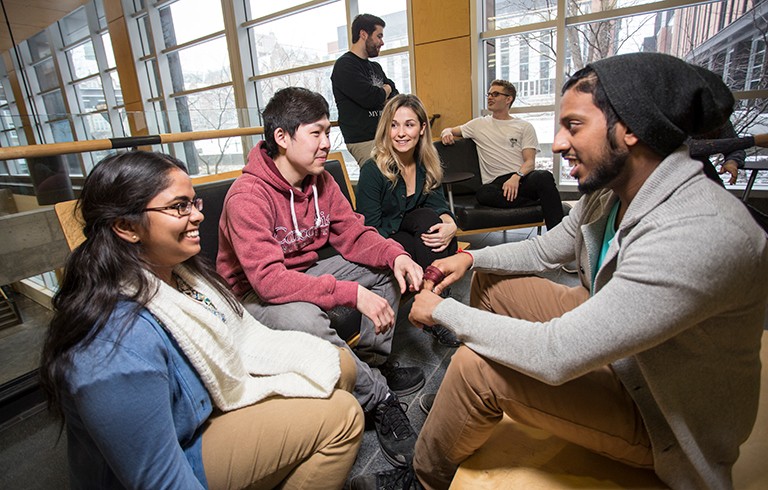Can universities leverage today’s moment to build the student experience of tomorrow?

This is the fifth in a series of articles profiling the different working groups that make up Future Concordia. Want to know how you can contribute? Send your questions, comments and suggestions to future@concordia.ca.
Throughout much of the COVID-19 pandemic, students from around the world have had to navigate significant changes to their university experience. Although they gained some things, including an acceleration in accessible online formats, they lost others.
The past couple of years also gave students the opportunity to formulate new ideas and expectations of what universities should be offering. For instance, while concerns over student mental health may not be new, the pandemic exacerbated existing issues and created new ones.
What other emerging needs should postsecondary institutions address in their services to students? How do universities look beyond the current moment to identify the key elements of a great student experience of the future?
To answers these and other questions, the university has tasked Alice Isac and Rebecca Tittler with co-chairing a Future Concordia working group made up of faculty, staff and students that is examining the student experience. The group is leading a reflection on how Concordia can continue to be responsive and agile in such an evolving context.
“We’re here to take this moment and learn from it in moving forward over the next three to five years,” says Tittler, part-time faculty member, academic advisor and research administration coordinator of the Loyola College for Diversity and Sustainability and the Loyola Sustainability Research Centre.
“The working group has had a lot of discussions about how to reach our different student communities. We want to make sure all students have access to experiential learning activities and to opportunities to network and prepare for their futures while they are at Concordia.”
 Rebecca Tittler and Alice Isac | Photos by David Ward
Rebecca Tittler and Alice Isac | Photos by David Ward
Best possible experience
When Isac first received the invitation to co-chair the working group, she was drawn to the project because of how the future of the student experience connects with her work as the lead of Concordia’s Experiential Learning (EL) Office.
“The research we’ve done and the information we’ve collected is informing the work that I do in the EL Office. I’m also seeing more clearly the impact that we’ve had across different areas of the university,” Isac says.
“It’s been eye-opening to take a step back, retreat from day-to-day work and create an intentional space where we have time to discuss the opportunities we can leverage and the challenges we may face as an institution.”
In late February, the working group held two focus-group consultations with students. Among other things, they asked participants to envision the core elements of a great student experience, from joining the Concordia community to preparing for life after graduation.
Through the information they collected at these consultations as well as the group’s ongoing work, they will provide a set of recommendations on how to offer students the best possible experience at Concordia and beyond.
“I’ve been involved in ‘blue sky’ processes like this before,” Tittler says. “Not all of the best ideas are going to work out exactly as they are initially envisioned but I’m convinced good things will come out of this process; it will be great to see how this progresses.”
Student perspective is crucial
Having met six times since last October, the student experience working group is now busy preparing a final report that they will present to Future Concordia’s steering committee in May.
Isac notes that the group’s members have learned a lot from each other, especially in conversations surrounding mentorship, experiential learning, technology infrastructure and student life.
“A key realization that emerged in our discussions was that no matter what doors students walk through or whoever they come across, it’s all one experience,” she notes.
“Approaching how we build out our services, supports and programming in the same holistic way is really critical in making a seamless student experience. And it’s not the responsibility of a single unit — we all have a role to play.”
For Tittler, working on a project that is planning for the future is very exciting, particularly because her work often involves advising undergraduate students on their future options.
“The pandemic has been really hard, but it’s also showed us a lot of gaps — where our seams may come apart — and a lot of opportunities,” she says. “I always have our students’ future in mind. I want to be able to feel like we’ve prepared them for success after Concordia, as well as during their time with us.”
Learn more about Future Concordia.




